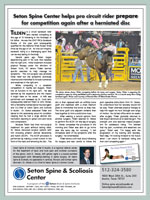Seton Spine Center helps pro circuit rider prepare for competition again after a herniated disc
Tilden is a circuit bareback rider who started competing at the age of 15 following in the footsteps of his father. He was the 2007 PRCA Bareback Rookie of the year and subsequently qualified for the National Finals Rodeo three times by the age of 24. As one can imagine, bareback riding is a challenging sport that can be very taxing on the body.

Several years ago Tilden began experiencing pain in his neck that radiated into his right arm. Initial treatment included physical therapy under the direction of Shawn Scott, DC where Tilden learned specific exercises to help manage his symptoms. The non-surgical care provided initial relief but the symptoms eventually returned and intensified to include numbness and weakness in the right arm.
While competing in a bareback competition in Seattle last August, Tilden lost all function in his right arm. He was alarmed by the experience and the impact it might have on his career. A MRI was performed and reviewed by Dr. Scott who subsequently referred Tilden to John Stokes, MD a fellowship trained spinal neurosurgeon and Co-Chief at Seton Spine and Scoliosis in Austin. Dr. Stokes evaluated Tilden and talked to him extensively about his condition relaying that he had a large cervical disc herniation resulting in spinal cord and nerve root compression.
Because Tilden had tried non-surgical treatment for years without lasting relief, Dr. Stokes discussed surgical options with him including anterior cervical discectomy and fusion (ACDF). The ACDF procedure is performed by making a small incision in the front of the neck and removing the disc. The disc is then replaced with an artificial bone graft and stabilized with a small titanium plate to immobilize the bones as they heal. The bone graft and adjacent vertebra then fuse together to form a solid bone mass.
After seeking a second opinion from another surgeon, Tilden selected Dr. Stokes to perform the ACDF. On the day of surgery, Dr. Stokes completed the procedure in the morning and Tilden was able to go home later the same day for recovery. “I felt immediate relief of my symptoms after the surgery,” he remembered.
Tilden wore a soft neck brace following his surgery and was careful to follow the post operative instructions from Dr. Stokes. He understood that full recovery would not be easy. Tilden attended physical therapy to help him regain his neck strength and range of motion. He started office work six weeks after surgery. Tilden gradually returned to low impact workouts at an exercise gym. The strength and core exercises helped prepare him for saddleback riding. “I’m relieved that my pain, numbness and weakness are gone,” Tilden said. “I’m happy with the progression of my training and recovery. Next step, I’m looking forward to the future when I can return to bareback riding and then start competing again.”
Click here to download a PDF detailing Tilden's successful treatment for a severe herniated disc.




